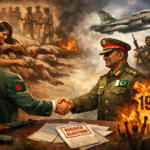When the Pakistan Army recently announced the launch of “Azm-i-Istehkam,” their latest counterterrorism operation, it was met with widespread scepticism and disdain. This operation, they claim, is designed to eradicate the growing menace of terrorism that has plagued Pakistan for decades. Yet, as with numerous previous operations, the announcement rings hollow to many observers within Pakistan and internationally. The reason for this cynicism is simple: the Pakistan Army and its notorious deep state have a long and sordid history of harbouring the very non-state actors they now claim to fight against. This duality not only undermines the effectiveness of their operations but also exacerbates the security situation in the region.
Historical Context: The Origins of the Deep State and Non-State Actors
To understand the present scenario, it is essential to delve into the historical context of the Pakistan Army’s relationship with non-state actors. The roots of this complex relationship can be traced back to the late 1970s and early 1980s, during the Soviet invasion of Afghanistan. The United States, seeking to counter Soviet influence, found a willing ally in Pakistan. The Pakistan Army, through its intelligence agency, the Inter-Services Intelligence (ISI), played a pivotal role in training and arming the Afghan mujahideen. This partnership not only helped to expel the Soviets but also established a network of militant groups that would later evolve into entities like the Taliban and Al-Qaeda.
Throughout the 1990s, the Pakistan Army continued to support these groups, using them as proxies to further its strategic interests, particularly in Afghanistan and Kashmir. The tacit support for these groups allowed them to grow in strength and influence, creating a Frankenstein’s monster that would eventually turn against its creator. Despite numerous warnings and the apparent blowback, the Pakistan Army remained committed to this strategy, driven by a misguided belief in its ability to control these groups.
The Mid-2000s: The First Wave of Counterterrorism Operations
By the mid-2000s, the consequences of this policy had become painfully clear. Pakistan was facing an unprecedented wave of terrorism, with attacks targeting civilians, military personnel, and infrastructure. In response, the Pakistan Army launched a series of counterterrorism operations, beginning with Operation Al-Mizan in 2002, followed by Operation Rah-e-Haq in 2007, and Operation Rah-e-Rast in 2009.
These operations, while successful in some respects, failed to address the root causes of terrorism in Pakistan. The army’s approach was primarily military, with little emphasis on addressing the socio-economic and ideological factors driving extremism. Moreover, the operations were marred by allegations of human rights abuses, including extrajudicial killings, torture, and enforced disappearances. These abuses undermined the operations’ legitimacy and fueled further resentment and radicalization among the affected populations.
Operation Zarb-e-Azb and Radd-ul-Fasaad: More of the Same
In 2014, the Pakistan Army launched Operation Zarb-e-Azb, a large-scale military offensive aimed at eliminating militant sanctuaries in North Waziristan. This operation was touted as a game-changer, with the army claiming to have dismantled the infrastructure of terrorism in the region. While Zarb-e-Azb did result in significant casualties among militant groups and the destruction of their hideouts, it failed to achieve its ultimate objective of long-term stability.
One of the main reasons for this failure was the army’s continued support for certain militant groups that it considered strategic assets. These groups, including the Haqqani Network and various factions of the Taliban, were allowed to operate with impunity, undermining the overall effectiveness of the operation. Additionally, the displacement of millions of civilians during the operation created a humanitarian crisis, further complicating efforts to stabilise the region.
In 2017, the Pakistan Army launched Operation Radd-ul-Fasaad, another counterterrorism initiative aimed at consolidating the gains of Zarb-e-Azb and targeting residual terrorist elements. However, like its predecessors, Radd-ul-Fasaad was criticised for its narrow focus on military solutions and failed to address the underlying drivers of extremism. The operation also suffered from the same credibility issues, with many questioning the army’s commitment to genuinely eradicating terrorism, given its continued ties to certain militant groups.
Azm-i-Istehkam: Another Chapter in a Cynical Saga
The launch of Azmi-Istehkam is the latest in this series of counterterrorism operations. The army claims that this operation will build on the successes of previous campaigns and finally root out the terrorist threat in Pakistan. However, given the historical context and the army’s track record, these claims take more work to take at face value.
One of the main criticisms of Azm-i-Istehkam is that it appears to be more of a public relations exercise than a genuine attempt to combat terrorism. The timing of the operation, coming shortly after a series of high-profile terrorist attacks, suggests that it is aimed at placating public anger and demonstrating the army’s resolve. However, with a fundamental shift in strategy, it is likely to achieve lasting results.
Moreover, the army’s continued reliance on heavy-handed military tactics raises serious concerns about human rights and civilian casualties. Past operations have shown that indiscriminate use of force can lead to significant collateral damage, further alienating the local population and fueling the cycle of violence. Unless the army adopts a more comprehensive approach that includes socio-economic development, political reforms, and ideological counter-narratives, Azm-i-Istehkam is likely to suffer the same fate as its predecessors.
The Deep State: The Elephant in the Room
One of the most significant obstacles to effective counterterrorism in Pakistan is the pervasive influence of the deep state. The term “deep state” refers to the shadowy network of military and intelligence officials who operate behind the scenes, often pursuing their own agendas independently of the civilian government. In Pakistan, the deep state has a long history of using militant groups as tools of state policy, both domestically and internationally.
This relationship is deeply entrenched and difficult to dismantle. The deep state views certain militant groups as valuable assets capable of furthering Pakistan’s strategic interests in Afghanistan and India. As a result, it has been reluctant to sever ties with these groups, even in the face of mounting evidence that they pose a serious threat to Pakistan’s own security.
The duality of Pakistan’s counterterrorism policy – cracking down on some militant groups while tacitly supporting others – has severely undermined its credibility. It has also led to a situation where terrorist groups can exploit these divisions, finding safe havens and support networks within Pakistan. Until the deep state is reined in and its policies are brought in line with a coherent national counterterrorism strategy, any efforts to combat terrorism are likely to be piecemeal and ineffective.
The Way Forward: Breaking the Cycle of Violence
To break the cycle of violence and terrorism, Pakistan needs a fundamental rethinking of its counterterrorism strategy. This requires a multi-faceted approach that goes beyond military solutions and addresses the root causes of extremism. Some key steps that Pakistan should consider include:
- Cutting Ties with All Militant Groups: The Pakistan Army and its intelligence agencies must sever all links with militant groups, regardless of their perceived strategic value. This includes dismantling support networks and taking decisive action against those who provide sanctuary or assistance to terrorists.
- Strengthening Civilian Institutions: Effective counterterrorism requires strong civilian institutions capable of implementing comprehensive policies. The military must support, rather than undermine, civilian authorities in their efforts to combat terrorism and promote development.
- Promoting Socio-Economic Development: Many regions affected by terrorism suffer from chronic poverty, lack of education, and inadequate infrastructure. Addressing these issues is crucial to undermining the appeal of extremist ideologies and providing alternatives to violence.
- Fostering Political Reforms: Inclusive and representative political systems can help address grievances and reduce the appeal of extremist movements. Pakistan must achieve excellent political stability and inclusivity, particularly in marginalised regions.
- Countering Extremist Ideologies: Military operations alone cannot defeat terrorism. A concerted effort must be made to counter extremist ideologies through education, media, and community engagement. Promoting a narrative of peace, tolerance, and coexistence is essential to winning the ideological battle against extremism.
Conclusion: A Need for Genuine Commitment
The launch of Azm-i-Istehkam, like previous counterterrorism operations, is unlikely to bring about lasting peace and stability in Pakistan unless there is a genuine commitment to addressing the root causes of terrorism. This requires a fundamental shift in the Pakistan Army’s approach, moving away from the cynical manipulation of militant groups and towards a comprehensive and inclusive strategy.
The international community also has a role to play in supporting Pakistan’s efforts to combat terrorism. This includes providing economic assistance, promoting political reforms, and encouraging regional cooperation. However, Pakistan’s primary responsibility lies with itself. Only by breaking free from the destructive cycle of violence and embracing a holistic approach to counterterrorism can Pakistan hope to achieve lasting peace and security.






